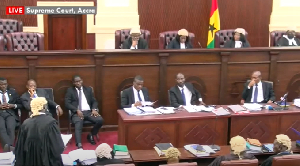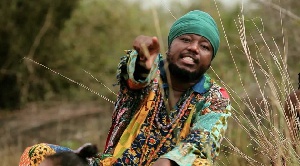Opinions of Monday, 13 November 2023
Columnist: Elilplim Doe Kwashie Zevor
Making the case against payments of reparations
Speaking at the 78th UN Session, Ghanaian President Nana Addo Danquah Akuffo Addo called for payment of reparations. According to him, nations that were heavily affected by this dehumanizing system must be compensated.
“Reparations must be paid for the slave trade".
“No amount of money will ever make up for the horrors, but it would make the point that evil was perpetrated, that millions of productive Africans were snatched from the embrace of our continent, and put to work in the Americas and the Caribbean without compensation for their labour,” he said.
The president is one of the many who have added his voice to the call for reparations payment to the continental African countries and the Africans in the
diaspora.
While this call may be good, there is a twist to the story that one fails to grasp including the president himself which is purely historical. The covering of truth about slavery in the primary school official curriculum and the teaching of slavery in Ghana is a major contributing factor in the approach to this unforgettable issue.
Trans Atlantic Slave Trade as a topic of instruction in our schools is completely whitewashed and narrowed not engineered to tell the truth about
slavery but to create a standard anti-White sentiment in general. For instance, when l was in school l was only taught how the Europeans bought and traded
African slaves without telling us about the roles of our forefathers, African chiefs, in slavery.
It is only in senior high school one can get a gist of history in general even with that, not every student offers history at this level so many will complete junior high school indoctrinated by the system with hatred toward white people.
The truth is slavery did not commence with the arrival of Don Diego d'Azambuja on the coast of Gold Coast in 1471. Long before he was sent by Prince Henry The Navigator of Portugal, powerful and dominant states or kingdoms were already raiding and enslaving smaller communities.
Some captured slaves were either used as human sacrifice or eunuchs, especially in the Asante Kingdom in Ghana. The access to guns and gunpowder made it easier for the slave raiders to go to the hinterland for more "goods" to be exchanged for rum, mirrors, tobacco, etc. These African tribal "soldiers" were participating in horrendous acts of violence including murder and rape before the Europeans arrived here.
They took their captives in fetters and sold them to the Whites who docked their ships at the coast and did not go into the jungles chasing after the Africans. Africans sold Africans as Kunta Kinta said in the movie Roots & "The Wolof sold the Madinka" and such was the fate of those ancestors of mine sold by their blood for nothing because of tribalism and hatred. Who should l be angry with?
The foreigner who bought me when my father thought l was useless and exchanged me for alcohol or my father himself?
The castles and forts on our coasts are remnants of yesterday's scars some of our evil forefathers inflicted on our people for power. Many people on the continent still blame White people for this evil business in which the Africans profited huge sums of money. Why couldn't our forefathers say no at the
inception of the trade? Because they were already visiting atrocities upon the tribes they hated, so it was justified.
Slavery in the eyes of the African raiders and chiefs was simply a justified business between them and the buyers. After all, when Don Diego d'Azambuja was leaving the Gold Coast Africans gifted a few 200 slaves without asking for it. That same hatred towards other blacks on the continent still exists overtly
and covertly.
Furthermore, the carvers of our official curriculum at the basic level have failed woefully intentionally to discuss the Trans-Saharan Slave Trade which was largely dominated by the Arabs. This trade began somewhere in the seventh century and lasted until the 1960s because Mauritania was the bastion of
this barbarism.
During the Arab Slave Trade or the Trans Saharan Slave Trade, men were captured and were largely castrated to prevent them from procreation and the women were taken as sex slaves. Places like the Horn of Africa, the Great Lakes Region, and Zanzibar were the flashpoints for these Arabs. infamous evil slave owners like Tippu Tip were instrumental in the supply of slaves to the Arabs.
The dehumanizing conditions forced a revolt in the Arab World which historians referred to as the Zanj Rebellion which took place in Basra in 869.
John Allembillah Azumah in his book THE LEGACY OF ARAB-ISLAM IN AFRICA threw more light on the perception of Arab historians on these slaves. For example, the Tunisian Arab historian Ibn Khaldun (1332-1406) wrote that “the only peoples to accept slavery are the Negroes, because of their lower degree of humanity, their place being closer to the animal stage.” Others, such as Ibn Sina (980–1037), similarly depict blacks as inherently inferior and destined to be enslaved by the rest of mankind.
To Ibn Sina blacks are ‘people who are by their very nature slaves’.
What l don't understand is why we keep on talking about the Trans-Atlantic Slave Trade but neglect the Trans-Saharan Slave Trade. While domestic slavery was inspired by tribalism, Trans Saharan Slave Trade and the Atlantic Slave Trade were inspired by religion and God.
Despite the "evil" nature of these Whites, Williams Wilberforce, Granville Sharp, and Thomas Clarkson fought the British government to abolish slavery in May 1807 and many others lost their lives at sea trying to prevent slave ships by any means necessary.
In conclusion, l do not support any idea of reparations payment since the trade was mutually beneficial to the Africans and the Europeans. After all, are the same African leaders who take loans on our behalf which cannot be accounted for the ones championing this course for money?













